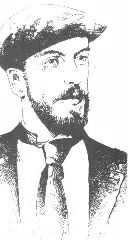Paul-Jean Toulet

| French literature |
|---|
| by category |
| French literary history |
| French writers |
|
| Portals |
|
Paul-Jean Toulet (5 June 1867, Pau, Pyrénées-Atlantiques - 6 September 1920) was a French poet, novelist and feuilleton writer.
Life and works
Paul-Jean Toulet was a descendant of Charlotte Corday, and son of a wealthy man living in Mauritius. He was most famous for his opus describing La vie parisienne.
In France, he is mostly famous for a book of verse, Les Contrerimes (Counterrimes). The book was published posthumously but many pieces had been incorporated in his novels or published in literary magazines from 1910 to 1914. Toulet became a model or an inspirator to the fantaisist poetic movement from 1911 until the war. This explains the following comment made on the reception of his works : "When two men who have read Jean Paul Toulet meet (usually in a bar), they immediately imagine it's a certain form of aristocracy." [1]
In 1897, Toulet received a copy of The Great God Pan by Arthur Machen from a friend and he translated it the following year. It was finally published in Le Plume in 1901 and then again by it, yet went unnoticed, except for Maeterlinck's reaction "... combining the traditional and scientific fantastic genres, it hits both our memories and hopes". Toulet engaged a correspondence with Machen and visited him in London.
Toulet's own novel Pan du Paur''was inspired by Machen. Published in 1898 by Simonis Empris, it wasn't successful either. In 1918, however, it was published again by the Éditions du Divan. This publishing company was owned by Toulet's admirer Henri Martineau who also led a correspondence with the author.
Footnotes
External links
| Wikiquote has a collection of quotations related to: Paul-Jean Toulet |
- Les Contrerimes (e-text, in French)
- Works by Paul-Jean Toulet at Project Gutenberg
|